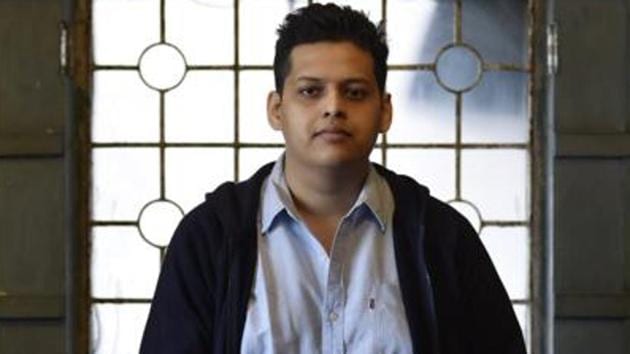The Disciple director Chaitanya Tamhane: Without international recognition, it’s difficult to get attention in India
Director Chaitanya Tamhane, whose film The Disciple won big at the Venice Film Festival, talks about attending a physical film festival in Covid times, whether it’s internationally where deserving films get more recognition, and more.
Director Chaitanya Tamhane is no stranger to accolades. His previous film, Court was selected as India’s official entry for the 88th Academy Awards, and now, his Marathi film The Disciple is winning praise the world over. At the 77th Venice Film Festival (VFF), it bagged two awards — Best Screenplay, and International Critics’ Prize, awarded by Federation Internat e de la Presse Cinematographique (FIPRESCI) jury.

Excerpts from an interview with the 33-year-old:
Such international acclaim, so much happening — has it sunk in yet, that The Disciple has created a buzz globally?
It hasn’t. It’s been positive, the response, and it’s one of those lifelong dreams that my film will make it to the main competition of the Venice Film Festival, which is the oldest and most prestigious film festival in the world. To actually be able to go there and present your film in person, in this kind of a year, the situation we are in, and then to win not one but two awards! It’s a bit overwhelming in a way. I am processing all of it right now.
Do you feel that it is internationally where deserving films are recognised, more than back home in India?
Well, that’s not entirely true. The thing is, we don’t make films for international validation, or for the Western eye necessarily. We do what we believe in, and then hope for an audience, and that it’ll resonate with people. The Disciple and my previous film Court, both are set in such a specific cultural context, that certain nuances and subtext only an Indian audience will be able to understand and respond to. One thing though is true — without international recognition, it’s difficult to get attention in this country (India). That is kind of tricky and a bit sad, that we need outsiders to first tell us ‘this is good’ for people here to realise. And I am not talking about just my own film, but any independent Indian filmmaker.
The Disciple is about a Hindustani classical singer’s personal and professional journey in Mumbai. How do you choose your subjects? Are they an outcome of careful deliberation?
This might seem like a pretentious answer, but the setting calls me to it. In a way, it’s outside of my control, as to what I will be fascinated by or obsessed with. In case of classical music, I don’t know when the bug kind of bit me. I myself have been fascinated, almost obsessed with the world of eccentric geniuses. I just started interviewing musicians, looking at their social media profiles, then the script, plot, characters kind of evolved from that research.
You went for the VFF, which was one of the rare physical film festivals held in the Covid 19 times. How was the experience?
It was very surreal, a bit strange to even process that okay, it’s outside of India, getting on a flight, landing in Venice. It was a big sign of hope to see a festival is happening, and also heartening to see how many safety protocols were in place, and how responsible everyone was being. This was a privilege, and something we need to be responsible and careful about. It had great energy, which you would have in a normal festival of that scale.
Did you always want to make films, or this profession was an accident?
I didn’t know while growing up that I want to be a filmmaker. As a id, I wanted to be an actor, as that’s the most immediate form of expression. Then I was in love with theatre. My mother would buy audio cassettes, of someone narrating stories and folk tales. Then in late teens, I discovered world cinema, and it blew my mind. I decided to make films.
India as a nation is obsessed with Bollywood. Did you ever think, before your debut film that you too should make a Hindi masala film, which would get a proper backing, when compared to a film which is rooted in real life and doesn’t have any potboiler elements, maybe making it hard to find many backers?
Right now, of course it’s difficult for independent films, which are quieter, or realistic, or just the ones which don’t fit into a masala frame, to get funding. And not just that, there are so many other challenges of getting an audience, or distribution, exhibition. There is a lack of institutional funding in this country, making things worse. Of course, like everybody growing up in a middle class family, I grew up watching Bollywood films, it’s a big part of our culture, and a unifier for society. But my entry point into filmmaking was world cinema, which is why I kind of skipped that route of wanting to make (Bollywood) films.
Any more physical film festivals for you in the Covid times?
That’s a good question. There are lots of invitations, but I am being a bit careful. The Disciple just finished it’s run at the Toronto Film Festival, it’s going for the New York film festival, selected for Busan, which is Asia’s biggest. I came back from Venice, and I had to be in quarantine for two weeks. I don’t know safe it is to keep taking the risk of travelling. More important is the film itself, which we are working on bringing to the Indian audiences.
Interact with the author on Twitter/ @RishabhSuri02
Follow @htshowbiz for Twitter
Get more updates from Bollywood, Taylor Swift, Hollywood, Music and Web Series along with Latest Entertainment News at Hindustan Times.
Get more updates from Bollywood, Taylor Swift, Hollywood, Music and Web Series along with Latest Entertainment News at Hindustan Times.





